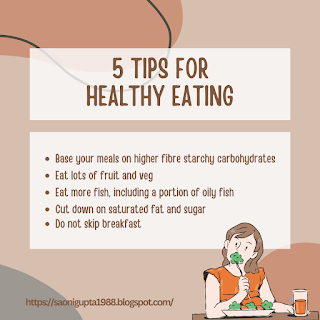Nutrition and Diet: The Key to Wellness
Introduction
Nutrition and diet are two important factors that play a vital role in our overall health and well-being. A balanced and healthy diet provides us with the necessary nutrients that our body needs to function properly. However, with the rise of processed foods and a fast-paced lifestyle, many people are not getting the nutrients they need. In this blog, I will discuss the importance of nutrition and diet, the essential nutrients, and some tips for maintaining a healthy diet.
Importance of Nutrition and Diet
Nutrition is the process by which our body absorbs and uses nutrients from the food we eat. A balanced and healthy diet provides us with the necessary nutrients that our body needs to function properly. The importance of nutrition and diet is not only limited to physical health but also mental health.
A poor diet can lead to various health problems like obesity, heart disease, diabetes, and cancer. A balanced diet is necessary for the growth and development of children, while a healthy diet can help in the prevention of chronic diseases in adults.
Essential Nutrients
Our bodies require six specific nutrients in order to be healthy. These include water, carbohydrates, fats, proteins, vitamins, and minerals.
Carbohydrates
Carbohydrates are the primary energy source for our body. Foods including rice, pasta bread, vegetables, and fruits contain them. There are two categories of carbohydrates: complex and simple.
Simple carbohydrates like sugar, honey, and syrup are easily digested and provide quick energy. Complex carbohydrates like whole grains, legumes, and vegetables take longer to digest and provide sustained energy.
Proteins
Proteins are necessary for the development and maintenance of our body's tissues. They are found in foods like meat, fish, poultry, eggs, beans, and nuts.
Proteins are made up of amino acids, and there are nine essential amino acids that our body cannot produce and must be obtained through our diet.
Fats
Fats are essential for the absorption of fat-soluble vitamins and for providing insulation for our bodies. They are found in foods like butter, oil, nuts, seeds, and fatty fish. Both saturated and unsaturated fats are forms of fat.
Saturated fats like butter and lard are solid at room temperature and can increase the risk of heart disease, while unsaturated fats like olive oil and nuts are liquid at room temperature and can help lower the risk of heart disease.
Vitamins
Vitamins are essential for various functions in our body, like immunity, vision, and growth. They are found in foods like fruits, vegetables, dairy products, and fortified cereals.
Water-soluble vitamins like vitamin C and B complex are not stored in our body and must be obtained daily, while fat-soluble vitamins like vitamin A, D, E, and K are stored in our body and can lead to toxicity if consumed in excess.
Minerals
Minerals are essential for various functions in our body, like building strong bones and teeth and maintaining fluid balance. They are found in foods like dairy products, meat, fish, and vegetables.
Microminerals and macrominerals and are the two different categories of minerals. Macrominerals like calcium, magnesium, and potassium are required in larger amounts, while microminerals like iron, zinc, and copper are required in smaller amounts.
Water
Water is one of the essential nutrients that our body needs to survive. It is required for various physiological functions in the body, and its absence can lead to severe health consequences. We should drink at least 8 –10 glasses of water per day to stay hydrated.
Water is essential in many bodily functions, like regulating body temperature, aiding in digestion, transporting nutrients and oxygen, supporting skin health, and eliminating waste like urine and sweat.
Tips for Maintaining a Healthy Diet
To maintain good health and wellbeing, one must follow a healthy diet. Here are some tips that can help you achieve and maintain a healthy diet:
Eat a variety of foods: Eating a variety of foods from different food groups, such as fruits, vegetables, whole grains, lean proteins, and healthy fats, ensures that you get all the necessary nutrients your body needs.
Pay attention to your portion sizes: Overeating, even nutritious foods, can result in weight gain. To prevent overeating, use smaller plates and control your portion sizes.
Limit processed and high-fat foods: Processed and high-fat foods are often high in calories, unhealthy fats, and added sugars. Limiting these foods can help reduce the risk of chronic diseases such as heart disease, diabetes, and obesity.
Be sure to hydrate yourself: For continued good health, you need to drink water. Stay hydrated by drinking plenty of water and limiting sugary drinks like soda and juice.
Reduce your intake of added sugars: Added sugars are often found in processed foods and beverages and can contribute to weight gain and other health problems. Check food labels for added sugars and aim to reduce your intake.
Don't skip meals: Skipping meals can lead to overeating later in the day and can cause fluctuations in blood sugar levels. To maintain a steady level of energy throughout the day, try to consume small, frequent meals.
Think ahead: You can make healthier decisions and prevent impulsive eating by planning your meals and snacks in advance. Make a grocery list and stock up on healthy foods to make meal preparation easier.
Conclusion
Our overall health and well-being depend on proper nutrition and diet. A balanced and healthy diet provides us with the necessary nutrients that our body needs to function properly. A diet that is high in processed and sugary foods can lead to various health problems like obesity, heart disease, diabetes, and cancer. By incorporating a variety of foods from all food groups and limiting processed and sugary foods, we can maintain a healthy diet and reduce the risk of chronic diseases. It is important to consult a healthcare professional for personalized nutrition advice based on individual needs.







Very helpful 👍
ReplyDeleteThank you so much !!! 😊
Delete